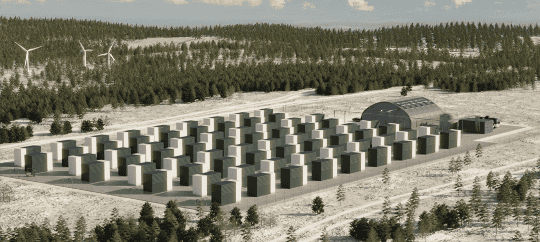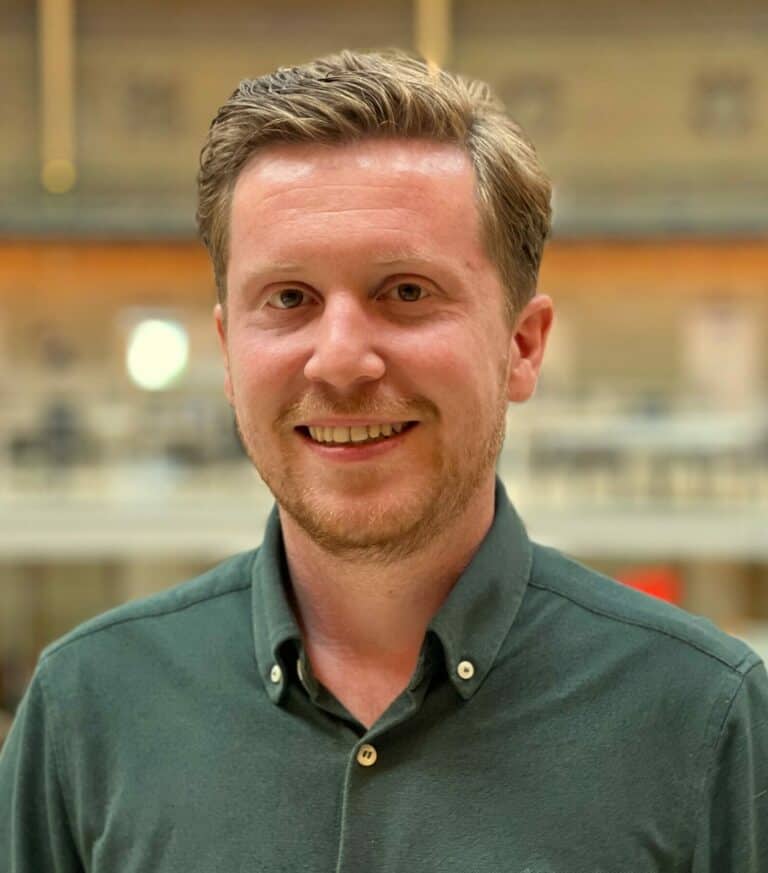Skytree was founded in 2014 after more than ten years of applied research into advanced air filter technology, also known as Direct Air Capture (DAC). This technology was originally developed for astronauts in space, commissioned by the European Space Agency (ESA). Taeke says: “The founders wondered if this technology could also be used on Earth to capture CO2 from the air on a large scale. After further development, this turned out to be possible, and so Skytree was given the mission to combat climate change with green 'CO2 management'. We have now grown into a scale-up with 70 to 80 employees.”
Economical use of CO2
Skytree is not the only company that does direct air capture. How does it differentiate itself from the competition? Taeke: “Other companies build large factories and then store the extracted CO2 underground – usually in countries with plenty of space and access to cheap sustainable energy, such as Iceland. A nice (partial) solution to the climate problem, but it is not really a business model: extraction and storage only costs money. We build smaller modular devices that also use the 'captured' CO2 economically on location. This is ideal for greenhouse horticulture, for example, where the captured CO2 is used to make plants grow faster. This approach makes our development cycle a lot shorter and makes us one of the few companies worldwide with multiple working units in the field.”
Helping gardeners get off gas
Taeke mentions the sector for a reason: Skytree has many growers as customers. “Greenhouse horticulture is a perfect market for us because CO₂ has direct economic value there. The sector also benefits from supportive regulations,” he explains. “All the necessary pipes for the supply of heat, electricity and CO2 to the greenhouse are already there, you can link our technology to that. At the moment, that CO2 and heat still come from gas combustion, but by 2040 the Netherlands must stop using gas and be climate neutral. Dutch greenhouse horticulture is the most innovative and progressive in the world, so you can expect a major shift to take place there sooner. Our technology facilitates that transition: our filter systems extract CO2 from the atmosphere for use in the greenhouse.”
Location for demonstration setup
What made Skytree participate in LeapSprong? Taeke: “Just before the program was announced, we shipped our first commercial devices and went from startup to scale-up. We participated in this program because we are located at the Science Park in Amsterdam and are looking for a location for a demonstration setup nearby. We think that would also be a great showcase for the municipality and the port of Amsterdam, who – just like us – like to profile themselves as pioneers in sustainability. Through the LeapSprong network, we had the ambition to find a suitable location within eight weeks. We now know that this is quite a challenge, but we remain determined!”
Expert tips on electricity
Getting power is also very difficult in the Netherlands at the moment – and therefore an extra challenge for Skytree's plans. Experts from LeapSprong pointed out to Taeke that large industrial parties often use less power than their energy contracts allow. "For example, if they structurally only use 8 Megawatts of the 10 Megawatts in their contract, there is always 2 Megawatts left. We at Skytree could use that unused 'residual power'. That would also be better for the electricity grid. The LeapSprong experts advised us to also pitch this solution to grid operators and energy suppliers."
Warm introduction to stakeholders
“Where LeapSprong started for us as a search for a location, it mainly gave us more understanding of the energy situation in the Netherlands and a warm introduction to the right parties to eventually find that location: the municipality, grid operators and energy suppliers in particular,” Taeke summarizes the added value of the program. “The workshops I followed on matters such as negotiating and pitching were valuable for my personal development.”
More and more sales and projects
Skytree is now making good progress. Taeke: “We are already selling our small system – the Skytree Cumulus, which can capture around 20 kg of CO2 per day – and we are currently launching our large device, the Skytree Stratus – which can remove around 1000 kilos of CO2 from the air per day. We are also increasingly entering into strategic partnerships. In the past year, we have been selected for a number of carbon removal projects in North America, where we connect multiple filter devices to each other to remove really large amounts of CO2 from the air. The power for these projects comes from enormous wind turbines and solar parks.” View Skytree's latest project here: Project Concho
“LeapSprong is an absolute must”
Taeke zou LeapSprong zeker aanraden aan startups en scale-ups die hun technologie nog aan het ontwikkelen zijn. “Het programma biedt de unieke kans om in een professionele beschermde omgeving tests te doen, waarin je zelfs toegang tot lab-medewerkers kan krijgen. Voor scale-ups zoals wij zijn vooral de ingangen bij gemeentelijke en industriële partners interessant. Daar krijg je anders namelijk niet snel de juiste persoon te pakken. Omdat de selectie voor het programma best streng is, zit je gegarandeerd aan tafel met slimme collega-ondernemers die intrinsiek gedreven met de energietransitie bezig zijn. Zo kun je ook zomaar mooie samenwerkingspartners ontmoeten. Het sparren met experts die jouw markt tot in detail kennen, is ontzettend nuttig om je propositie aan te scherpen.”
Leap jump 2025
Rockstart, the municipality of Amsterdam and ETCA are the initiators of Leapsprong 2025. Together with the Amsterdam Metropolitan Area, Amsterdam Chemistry Network, the North Sea Canal Area, Port of Amsterdam, Soapbox and the Amsterdam Institute for Advanced Metropolitan Solutions, ROM InWest is a partner of the programme. This initiative supports start-ups and scale-ups in financing and growth – from investments and subsidies to valuable connections. Learn more about Leap jump 2025? Contact our Business Developer Robin van Beijnum


